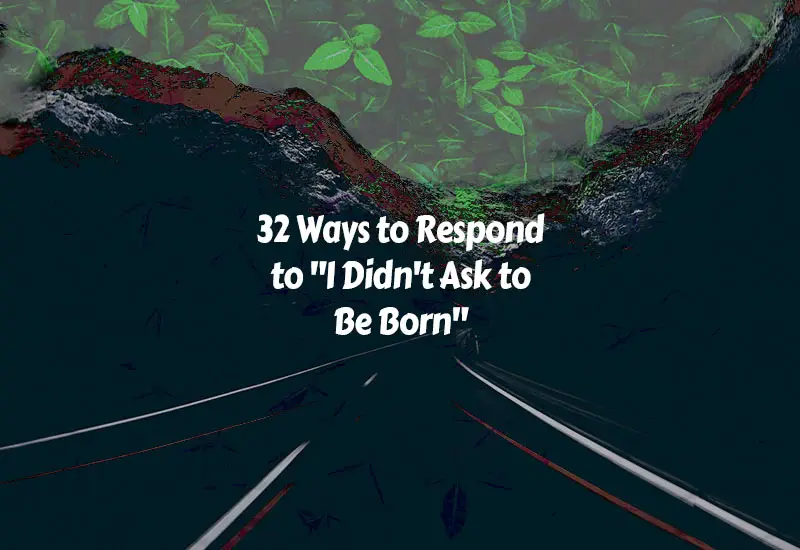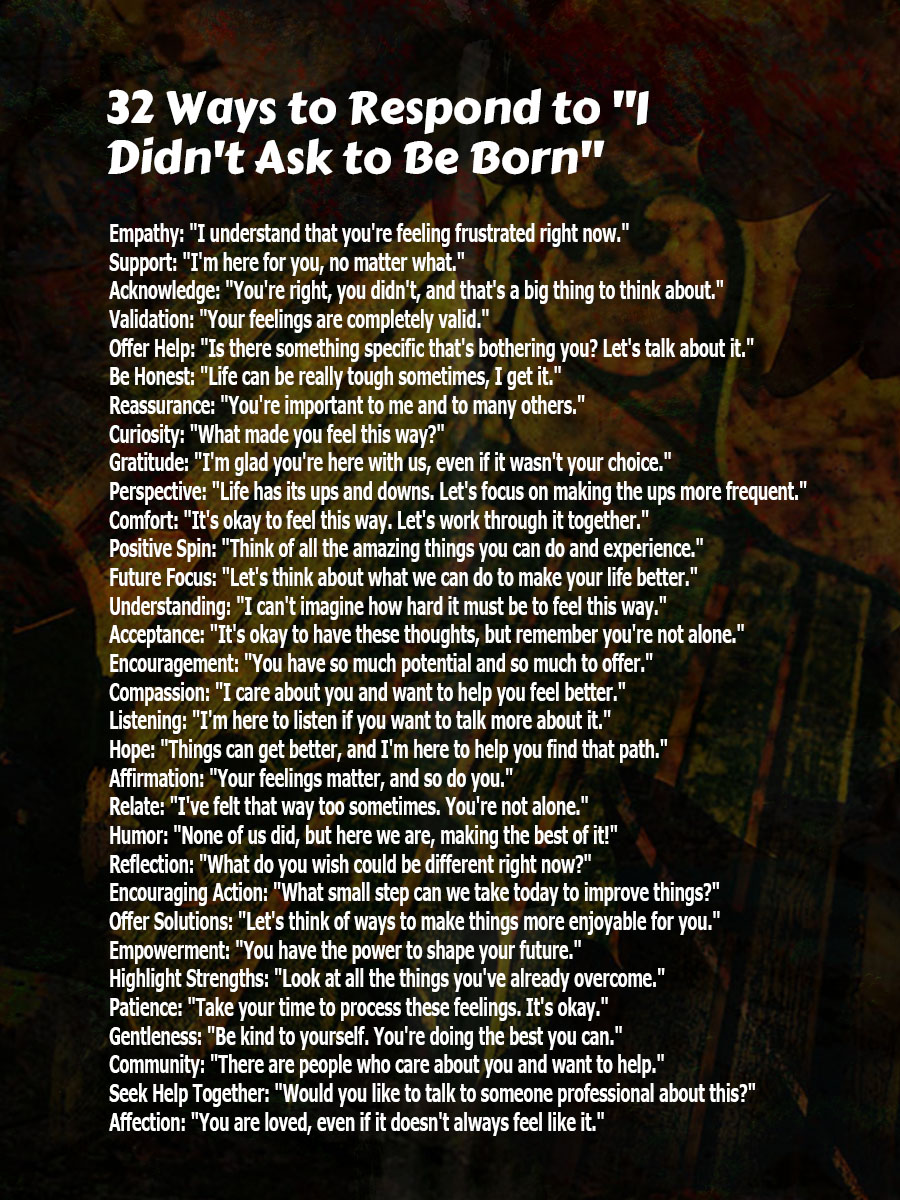When kids or teens say, “I didn’t ask to be born,” it can be tough for parents. This phrase often means they are feeling sad, upset, or misunderstood. In this blog post, we will look at kind and helpful ways to respond. We will talk about how to listen, show love, and understand their feelings. Our goal is to make them feel heard and supported. By learning the best ways to respond, parents can help their kids feel better and build a stronger bond.

Here are 32 Ways to Respond to “I Didn’t Ask to Be Born”:
- Empathy: “I understand that you’re feeling frustrated right now.”
- Support: “I’m here for you, no matter what.”
- Acknowledge: “You’re right, you didn’t, and that’s a big thing to think about.”
- Validation: “Your feelings are completely valid.”
- Offer Help: “Is there something specific that’s bothering you? Let’s talk about it.”
- Be Honest: “Life can be really tough sometimes, I get it.”
- Reassurance: “You’re important to me and to many others.”
- Curiosity: “What made you feel this way?”
- Gratitude: “I’m glad you’re here with us, even if it wasn’t your choice.”
- Perspective: “Life has its ups and downs. Let’s focus on making the ups more frequent.”
- Comfort: “It’s okay to feel this way. Let’s work through it together.”
- Positive Spin: “Think of all the amazing things you can do and experience.”
- Future Focus: “Let’s think about what we can do to make your life better.”
- Understanding: “I can’t imagine how hard it must be to feel this way.”
- Acceptance: “It’s okay to have these thoughts, but remember you’re not alone.”
- Encouragement: “You have so much potential and so much to offer.”
- Compassion: “I care about you and want to help you feel better.”
- Listening: “I’m here to listen if you want to talk more about it.”
- Hope: “Things can get better, and I’m here to help you find that path.”
- Affirmation: “Your feelings matter, and so do you.”
- Relate: “I’ve felt that way too sometimes. You’re not alone.”
- Humor: “None of us did, but here we are, making the best of it!”
- Reflection: “What do you wish could be different right now?”
- Encouraging Action: “What small step can we take today to improve things?”
- Offer Solutions: “Let’s think of ways to make things more enjoyable for you.”
- Empowerment: “You have the power to shape your future.”
- Highlight Strengths: “Look at all the things you’ve already overcome.”
- Patience: “Take your time to process these feelings. It’s okay.”
- Gentleness: “Be kind to yourself. You’re doing the best you can.”
- Community: “There are people who care about you and want to help.”
- Seek Help Together: “Would you like to talk to someone professional about this?”
- Affection: “You are loved, even if it doesn’t always feel like it.”
See Also: 36 Best Ways to React When Someone Sends You a Funny Video
Exploring The Statement
Understanding The Source Of The Statement:
The statement “I didn’t ask to be born” often arises from feelings of confusion and frustration, especially in adolescents.
Implications Of The Statement:
This statement can indicate a cry for help, a sense of lack of control, or a plea for understanding.
Empathetic Responses
Empathetic responses to the statement “I didn’t ask to be born” are crucial in understanding and addressing the underlying emotions and concerns. By acknowledging the feelings and validating the emotions of the individual, you can create a supportive and empathetic environment to address this statement effectively.
Acknowledging Feelings
Acknowledging the feelings behind the statement “I didn’t ask to be born” is the first step in providing an empathetic response. By acknowledging the feelings, you show that you are receptive to the emotions being expressed and are willing to understand the perspective of the individual.
Validating Emotions
Validating the emotions conveyed in the statement is essential to demonstrate empathy. By acknowledging the validity of the emotions being expressed, you can help the individual feel understood and supported, creating an environment where they feel comfortable expressing themselves without judgment.
Fostering Communication
When faced with the statement “I didn’t ask to be born,” it’s vital to foster communication and create an environment where open dialogue can flourish. Encouraging open dialogue and creating a safe space for discussion are key elements in navigating this difficult topic with your child. By embracing these techniques, you can build a stronger bond and address their concerns effectively.
Encouraging Open Dialogue
Engage in active listening: Give your child your full attention when they express their emotions or frustrations. This shows them that their feelings are valid and that you respect their perspectives.
Ask open-ended questions: Encourage your child to share their thoughts by asking questions that require more than a simple yes or no answer. This allows them to express themselves more fully and enables you to gain deeper insight into their concerns.
Show empathy: Validate your child’s feelings by demonstrating understanding and compassion. Let them know that it’s okay to feel the way they do and that you are there to support them.
Creating A Safe Space
Set aside dedicated time: Find a quiet and comfortable space where you and your child can have a meaningful conversation without distractions. This focused attention lets them know that their thoughts and feelings are important to you.
Establish trust: Create an environment of trust and non-judgment, assuring your child that they can openly express themselves without fear of criticism or punishment. This safe space encourages honest and open communication.
Keep conversations confidential: Maintain confidentiality unless there is a concern for their safety or the safety of others. Respecting their privacy helps build trust and allows them to share more openly.
Be patient: Fostering communication takes time. Give your child the space they need to express themselves. Avoid interrupting or rushing the conversation, allowing them to fully articulate their thoughts and concerns.
Perspective And Context
When faced with someone expressing the sentiment, “I didn’t ask to be born,” it is crucial to understand the perspective and context behind their words. Encouraging reflection and providing perspective can help foster understanding and empathy in these situations.
Encouraging Reflection
Encouraging reflection involves creating a safe space for the individual to express their feelings and explore their thoughts more deeply. This can be done through active listening and asking open-ended questions that prompt introspection.
The following strategies can help facilitate reflection:
- Encourage the person to identify and vocalize their emotions.
- Ask them to reflect on the reasons behind their statement, promoting self-awareness.
- Validate their feelings and let them know you are there to support them.
Providing Perspective
Providing perspective involves offering alternative viewpoints and helping the person see their situation in a broader context. This can help them understand that their feelings are valid, but there are other factors to consider.
Consider utilizing the following approaches to provide perspective:
- Explain that life is a journey full of unexpected challenges and opportunities for growth.
- Highlight the connections between their experiences and the experiences of others, emphasizing shared struggles and triumphs.
- Discuss how their existence has the potential to make a positive impact on the lives of others.
By listening, reflecting, and providing perspective, you can help the individual gain a better understanding of their feelings while encouraging them to embrace their unique existence. Remember, empathy and understanding are key to navigating conversations around not asking to be born.
See Also: 28 Great Ways to Reply to Happy New Year Boss
Encouraging Self-discovery
When faced with the statement “I didn’t ask to be born,” it can be an opportunity to encourage self-discovery and equip individuals with the tools to navigate their own existence. Here are some ways to foster this process:
Exploring Personal Values
One approach to nurturing self-discovery is by emphasizing the exploration of personal values. By engaging in this process, individuals can gain clarity on what truly matters to them. This can be achieved through activities such as journaling, introspection, and seeking out experiences that resonate with their core beliefs.
Empowering Autonomy
An essential aspect of encouraging self-discovery is empowering autonomy. By providing space for individuals to make their own decisions and learn from their experiences, they can cultivate a deeper understanding of themselves and their unique place in the world.

More Additional Responses
- Companionship: “Let’s go do something fun to take your mind off things.”
- Empathy and Action: “I know it’s hard. How can I support you right now?”
- Sincerity: “Your presence in this world makes a difference.”
- Mindfulness: “Let’s focus on the present moment and find something positive.”
- Reflection on Positives: “What are some things you enjoy or are grateful for?”
- Perspective Shift: “Life is unpredictable. Sometimes, unexpected things can be good.”
- Self-Care: “How about we find some activities that make you feel good about yourself?”
- Value: “You bring unique qualities to this world that no one else does.”
- Life’s Meaning: “Life can be challenging, but it’s also full of potential.”
- Optimism: “There are so many possibilities ahead of you.”
- Growth: “Struggles can make us stronger and more resilient.”
- Connection: “Let’s connect with others who understand what you’re going through.”
- Future Plans: “What are some things you’d like to achieve or experience?”
- Change: “We can work together to change what’s making you feel this way.”
- Human Experience: “Everyone has difficult times. It’s part of being human.”
- Small Joys: “Let’s find joy in small things, one step at a time.”
- Reassurance of Worth: “You are valuable just by being you.”
- Shared Stories: “Want to hear about a time I felt similarly?”
- Celebrate You: “Let’s celebrate the wonderful person you are.”
- Let's Dream: “What are some dreams or goals you have, no matter how big or small?”
See Also: 32 Playful Responses to "May the 4th Be With You"
I hope this helps you understand how to answer when someone says, “I didn’t ask to be born.” You can listen to their feelings, show you care, and talk kindly. Explain that life has both good and hard times, and everyone has a purpose. Remind them they are important and loved. Offer support and be there for them. With patience and understanding, you can make them feel better and more valued.









